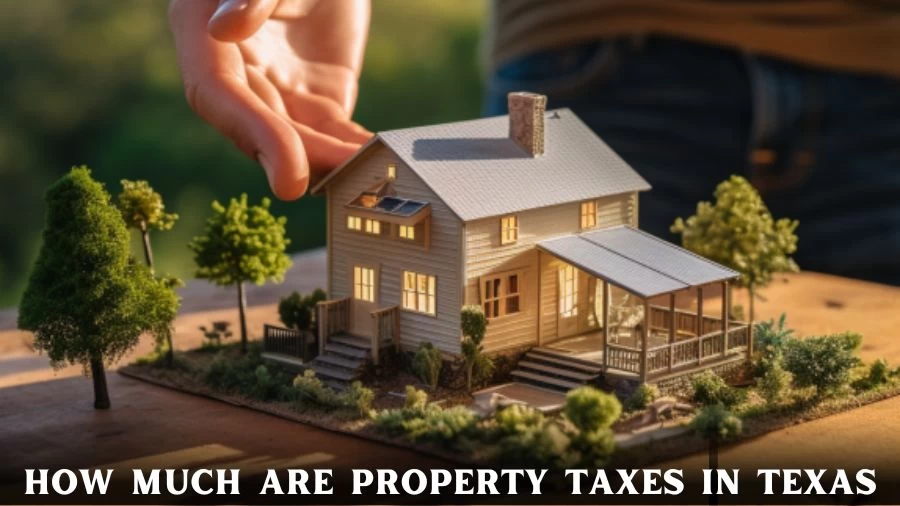
How Much Are Property Taxes in Texas? How to Reduce Property Taxes in Texas? When Will Texas Property Taxes Go Down?
Texas property taxes fluctuate due to local factors, averaging around 1.60%, and efforts to decrease them involve actions like protests, hearings, and appeals, with reductions linked to legislative choices, economic conditions, and local policies such as Senate Bill 2.
by Kowsalya
Published Aug 31, 2023 | Updated Aug 31, 2023 | 📖 9 min read
On This Page
- How Much Are Property Taxes in Texas?
- How to Reduce Property Taxes in Texas?
- When Will Texas Property Taxes Go Down?
- Are Property Taxes Yearly in Texas?
- Is Texas Property Tax Higher Than CA?
- Why Are Property Taxes So High in Texas?
- When Are Property Taxes Due in Texas?
- How Do Texas Property Taxes Work?
How Much Are Property Taxes in Texas?
The amount of property taxes in Texas varies based on several factors, including the property's location, assessed value, and local tax rates. The average effective property tax rate in Texas is 1.60%, which is higher than the national average of 0.99%. This means that, on average, Texas homeowners pay 1.60% of their property's assessed value in taxes annually.
For instance, if we consider the average annual property tax payment of $3,797 that a typical Texas homeowner pays, we can estimate the average home value. By dividing the tax payment by the tax rate, we arrive at an approximate average home value of $237,312 ($3,797 / 0.0160 = $237,312). However, these figures are averages, and actual property tax amounts can vary significantly based on the specific characteristics of the property and its location.
It's important to note that Texas lacks a state income tax, making property taxes a substantial source of revenue for local governments. These taxes fund essential services such as schools, water systems, law enforcement, and other local initiatives. The decentralized nature of property taxation in Texas means that there are approximately 4,000 local entities, including cities, counties, and school districts, that can collect property taxes. This setup allows for diverse property tax policies across different regions.
How to Reduce Property Taxes in Texas?
Here is the steps for lowering property taxes in Texas,
1. File a Notice of Protest: Initiating the process to lower your property taxes in Texas begins with filing a formal notice of protest. This serves as an official declaration of your intent to challenge the assessed value of your property. This notice must be submitted within a specific timeframe, usually shortly after you receive your property tax assessment notice. The notice of protest acts as the initial step to engage with the local appraisal district and signal your disagreement with the property's assessed value.
2. Prepare Information for Hearing: As you move forward, gather relevant information to support your case for a lower property tax assessment. This could include recent property sales data, property appraisals, photographs illustrating any issues affecting your property's value, and comparable property assessments in your neighborhood. This preparation is crucial for presenting a well-founded argument during the appeal process.
3. Attend an Informal Hearing at the Appraisal District Office: After filing your notice of protest, you might be offered an opportunity to attend an informal hearing at the local Appraisal District office. During this meeting, you can present your evidence, explain your reasoning for a lower assessment, and engage in a discussion with an appraiser or representative. This informal setting provides a chance to negotiate and potentially resolve the matter without further formal proceedings.
4. Attend an Appraisal Review Board Hearing: If the informal hearing does not lead to a satisfactory outcome, the next step involves attending a formal Appraisal Review Board (ARB) hearing. The ARB is an independent panel that reviews property assessment disputes. At the ARB hearing, you'll present your case, present evidence, and make arguments as to why your property's assessed value should be reduced. The ARB will carefully consider the presented information before rendering a decision.
5. Appeal Through District Court or Arbitration: In cases where the ARB decision doesn't align with your expectations, you have the option to pursue further action. You can appeal the decision by taking the matter to district court or opting for arbitration. This step involves legal procedures and might require the assistance of an attorney with expertise in property tax appeals. Keep in mind that this step is more formal and typically involves higher costs.
Successfully navigating these steps can potentially lead to a reduction in your property tax burden. It's important to remember that the process might involve multiple stages and requires careful preparation and documentation. Engaging in the appeal process demonstrates your commitment to ensuring that your property is fairly assessed and that your tax obligations accurately reflect its value.
When Will Texas Property Taxes Go Down?
The question of when Texas property taxes will go down depends on various factors, including legislative decisions, economic conditions, and local government policies. Senate Bill 2 (Bettencourt/Meyer) was designed to provide property tax relief through measures such as tax rate compression and an increase in the homestead exemption. However, the exact timeline for when property taxes will decrease significantly can be influenced by the effectiveness of these measures and other economic considerations.
Property tax rates and changes are typically determined by local governments, and they can vary from year to year based on local budgetary needs, property assessments, and other factors. It's important to keep in mind that while efforts are made to provide property tax relief, other factors in the economy and local governance can impact the actual trajectory of property taxes.
Are Property Taxes Yearly in Texas?
On average, Texan homeowners bear an annual property tax burden of $3,797. These funds play a pivotal role as the chief financial backbone for regional governing bodies, facilitating the provision of vital local amenities and services.
The revenue generated from these taxes serves as the lifeblood for crucial sectors such as education, ensuring the smooth operation of schools, and the maintenance of water systems that sustain communities.
Moreover, these funds contribute to the upkeep of law enforcement agencies, enhancing public safety and maintaining order. It is through this consistent influx of property taxes that local governments are empowered to cultivate and maintain the essential infrastructure and services that underpin the quality of life for Texas residents.
Is Texas Property Tax Higher Than CA?
The property tax landscape in Texas presents an unexpected challenge to its reputation as a tax-friendly state compared to California. While Texas offers relatively more affordable housing, the property tax burden significantly impacts homeowners' budgets. With a tax rate of 1.74%, Texans face a higher property tax burden than their Californian counterparts, where the effective rate stands at 0.75%.
This contradicts the commonly held belief that Texas has substantially lower property taxes. Despite the higher taxes, many Californians are drawn to Texas due to its lower overall cost of living. The state's affordability, combined with its unique attractions and cultural experiences, continues to attract a significant number of Californian migrants.
Around one in every ten individuals who have recently moved to Texas are from California, showcasing that the allure extends beyond just property tax considerations.In light of this, the Texas dream requires a more nuanced evaluation. While housing costs might seem appealing, the weight of property taxes could neutralize the perceived advantages.
It's vital for prospective homeowners to holistically assess the financial implications of property ownership in Texas, factoring in both housing prices and property taxes. Ultimately, while Texas may still hold charm and economic advantages for many, the higher-than-expected property tax reality challenges the notion of Texas as an unequivocally tax-friendly state when compared to California.
Why Are Property Taxes So High in Texas?
Property taxes in Texas are notably elevated due to the state's distinctive tax structure. One key factor is the absence of a personal income tax, which compels the state to heavily rely on alternative revenue sources. Consequently, property taxes assume a more significant role in funding public services and government operations. This reliance on property taxes to fill the revenue gap has led to comparatively high property tax rates in the state, placing a substantial financial burden on homeowners.
The revenue collected from property taxes is essential for funding various sectors, including public schools, local governments, and special districts, further contributing to the elevated tax rates. Efforts to address this issue have prompted discussions and proposals for property tax relief, with debates revolving around finding effective means to alleviate the burden without compromising essential services.
When Are Property Taxes Due in Texas?
Property taxes in Texas are typically due by January 31st. If taxes remain unpaid on February 1st, they are considered delinquent, leading to the addition of penalty and interest charges.
Taxing units provide at least 21 days for payment after mailing the original bill, and if the bill is sent after January 10th, the delinquency date is postponed to the first day of the following month that allows for at least 21 days for payment.
Property owners often pay before year-end for federal income tax deduction purposes. In case of appeals to district court or arbitration, taxes not in dispute must be paid before the delinquency date, with the option to request a court-excused prepayment through a hearing.
How Do Texas Property Taxes Work?
In Texas, residential properties undergo annual appraisals conducted by county appraisal districts. These entities determine the present market value of all properties within the county, forming the basis for tax payments. Any disagreements with the appraisals are addressed through an appraisal review board, composed of local citizens. Property assessments occur at the start of each year, typically leading to appraisal review board hearings commencing in May.
Tax bills are dispatched starting from October 1 and are expected to be settled by January 31 of the ensuing year. Numerous exemptions are available to help reduce property taxes in Texas. The most prevalent is the homestead exemption, accessible to homeowners in their primary dwelling. This exemption shields a minimum of $25,000 from taxation in terms of the property's value.
However, it's important to note that this exemption is obligatory only for school districts, while other types of taxing districts can choose whether to implement it. Consequently, if a property valued at $150,000 benefits from the homestead exemption, the school district tax rate will solely be applicable to $125,000 of the property's value. Moreover, individuals aged 65 and older or those with disabilities can claim an additional exemption of $10,000.
Similar to the homestead exemption, this added benefit is mandated solely for school districts. These mechanisms illustrate Texas' approach to property taxation, offering various avenues for property owners to reduce their tax liabilities, particularly through exemptions catered to different circumstances.
How Much Are Property Taxes in Texas - FAQs
1. What is the average effective property tax rate in Texas?
The average effective property tax rate in Texas is 1.60%, which is the seventh-highest in the United States. In comparison, the national average effective property tax rate is 0.99%.
2. How much do Texans typically pay in property taxes annually?
On average, a typical homeowner in Texas pays around $3,797 in property taxes each year.
3. What do property taxes in Texas fund?
Property taxes in Texas are a primary source of revenue for local governments, including cities, counties, and school districts.
4. How are property taxes calculated in Texas?
Property taxes are calculated by assessing the market value of a property, factoring in elements like property size, location, improvements, and comparable sales.
5. When are property tax bills due in Texas?
Property tax bills in Texas are typically due around January 31st of each year.




